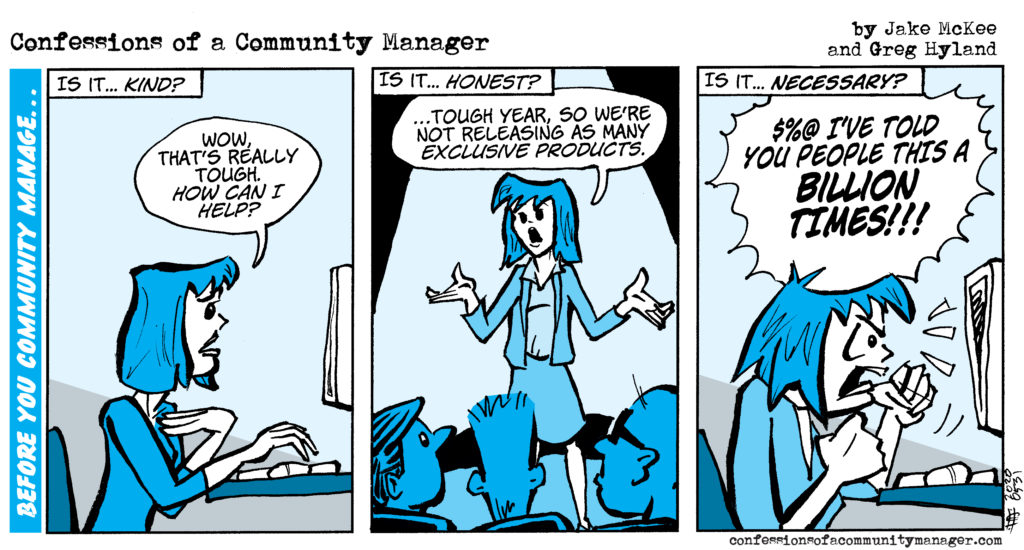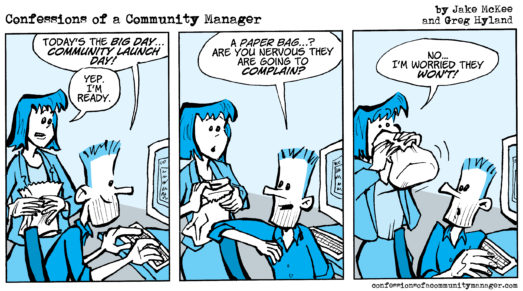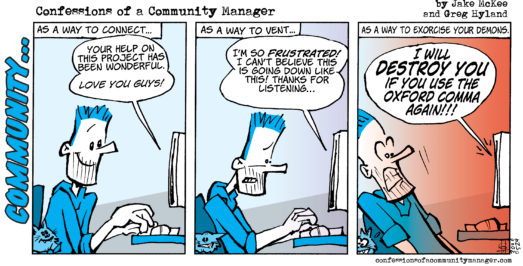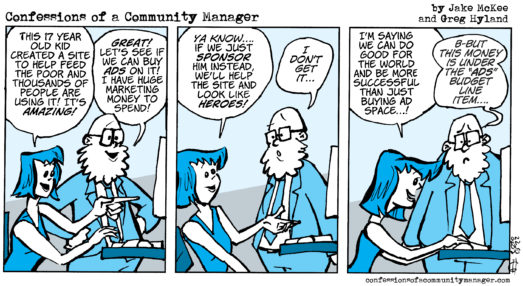Before you community manage…
Every parent has their go-to phrases. You know the ones… we all have a collection of them burned into our brains forever. Today’s comic comes to you courtesy of my mother. One of her famous Mom-isms is one I have now used with my own daughter. And I’ve also used it on a regular basis as an online Community Professional and professional communicator.
“Before you speak remember to ask yourself: is it kind, honest, necessary”.
– My Mom
I must have heard this 2,368 times growing up. Probably more. This isn’t a complaint, really. It’s a brilliantly simple way to think about how you speak and connect with other people.
As Community Professionals, especially those of us doing day-to-day community management, communication and engagement is a significant part of our daily activities. And the daily grind can really wear you down. Any community manager who tells you they have never wanted to let loose a string of profanities or Babe Ruth the keyboard into the monitor after reading a particularly challenging forum thread is either lying or working with a community that hasn’t launched with real people yet.
Online communication is, as we all know, challenging in the best of times…and a disaster in the worst of times. There’s a reason that therapists will tell couples to stop texting each other and start talking face to face if they want to improve their communication.
I recently came across this quote from Captain America and it broke my heart given that I’ve spent my career (more than two decades) trying to create positive online interactions, especially in “message boards”:
“As actor I’ve never felt better after reading a message board”
– Actor Chris Evans
Community Managers are not just traffic cops, they’re role models. The way they behave sets the model for the entire community, the culture itself. Many of the communities that go so far off the rails (YouTube comments, I’m looking at you) lack any significant presence of an active Community Manager that the members know. The members miss out on the ability to observe positive modeled behaviors. I’ll save the discussion about the reasons why for another post, but it typically comes down to budget, scale, executive buy-in conversations.
Instead, let’s focus on a key tool in the Community Manager’s toolbox to help avoid Babe Ruthing:
The Community Manager Response Filter
Since we all have our moments of frustration, the CMRF (yes, it has an acronym now) is equal parts meditation and methodology. Before each post you might make, simply ask yourself:
- Is this Kind? – Will it add joy to the reader’s day? Not just the intended recipient, but all the other community members who might also read it. Remember that modeled behaviors aren’t always meant for the single recipient alone.
- Is this honest? – Are you sharing honest information or are you throwing out fluffed up corporate speak jibberish? Every communication is an opportunity to build trust, model culture, and show your humanity. Community members would much rather hear “I can’t share that, but here’s what I can share” than “well despite being down 150% our increase are up 35%!” If you are having a rough year, just say that. You’ve been trained all your career to never, ever say anything “bad” about the company you work for in public. But funny thing… when you share the truth, even when it’s rough, the community responds in overwhelmingly supportive ways.
- Is it necessary? – In the immortal words of Kenny Rogers, “You’ve got to know when to hold ’em, Know when to fold ’em, Know when to walk away”. Or maybe more succinctly put, “Don’t’ start none, won’t be none”. One of the biggest choices we make as professional communicators is when to engage and when to let things slide on by. And some days, what feels SO VERY IMPORTANT to respond to can dissipate if we just give in a few minutes or hours to resolve itself. Or if we give other community members a chance to step in. Or if we work in the background with community leaders to provide facts that they can bring forward for us. The “is this necessary” question feels so obvious until we’re in the heat of the moment, and our blood in boiling or our anxiety is peaking. Take a second before you start to type or before you hit the Post button to ask (and sometime re-ask) yourself “do I really need to reply?”
Again, the key here is that we’re modeling behaviors. Every time we engage (or choose not to), we’re adding another brick in the cultural paths that guide members through our community. Never underestimate the impact your actions have on the community. Members are watching. Always.
Amusing side note: turns out that my brilliant mom didn’t come up with this saying on her own. Google searching credits Bernard Meltzer, a 1960s radio call-in show host. Apparently we community managers have a lot to learn from those who were dealing with community members well before our team or our technology!
Before you speak ask yourself if what you are going to say is true, is kind, is necessary, is helpful. If the answer is no, maybe what you are about to say should be left unsaid.
Bernard Meltzer
But for the record, I’m still crediting my Mom.



